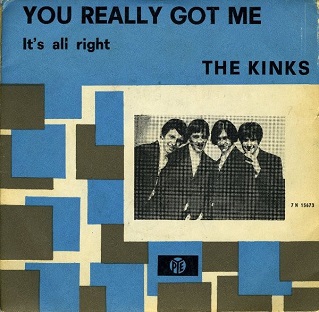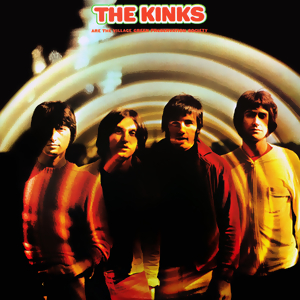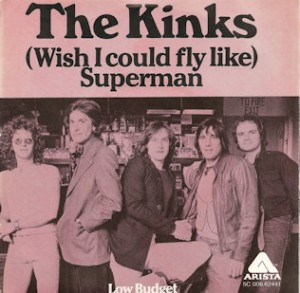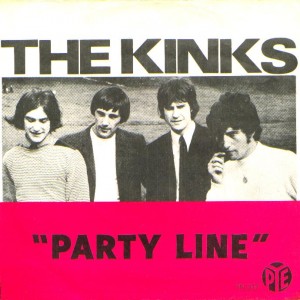
David Russell Gordon Davies is an English singer, songwriter and guitarist. He is the lead guitarist and backing singer for English rock band the Kinks, which also features his elder brother Sir Ray Davies.

"You Really Got Me" is a song written by Ray Davies for English rock band the Kinks. The song, originally performed in a more blues-oriented style, was inspired by artists such as Lead Belly and Big Bill Broonzy. Two versions of the song were recorded, with the second performance being used for the final single. Although it was rumoured that future Led Zeppelin guitarist Jimmy Page had performed the song's guitar solo, the myth has since been proven false.

Face to Face is the fourth studio album by the English rock band The Kinks, released in October 1966. The album marked a shift from the hard-driving style of beat music that had catapulted the group to international acclaim in 1964. It is their first album consisting entirely of Ray Davies compositions, and has also been regarded by critics as rock’s first concept album. The album was included in Robert Christgau’s "Basic Record Library" of 1950s and 1960s recordings, published in Christgau's Record Guide: Rock Albums of the Seventies (1981). The album was included in the book 1001 Albums You Must Hear Before You Die.

The Kinks Are the Village Green Preservation Society is the sixth studio album by the English rock group the Kinks, released in November 1968. It was the last album by the original quartet, as bassist Quaife left the group in early 1969. A collection of vignettes of English life, Village Green was assembled from songs written and recorded over the previous two years.

"Waterloo Sunset" is a song by British rock band the Kinks. It was released as a single in 1967, and featured on their album Something Else by the Kinks. Composed and produced by Kinks frontman Ray Davies, "Waterloo Sunset" is one of the band's best known and most acclaimed songs, and ranked number 42 on Rolling Stone's 500 Greatest Songs of All Time. It was also their first single that was available in true stereo.

Arthur , often referred to as just Arthur, is the seventh studio album by English rock band the Kinks, released in October 1969. Kinks frontman Ray Davies constructed the concept album as the soundtrack to a Granada Television play and developed the storyline with novelist Julian Mitchell; the television programme was never produced. The rough plot revolved around Arthur Morgan, a carpet-layer, who was based on Ray and guitarist Dave Davies' brother-in-law Arthur Anning.

Lola Versus Powerman and the Moneygoround, Part One, commonly abbreviated to Lola Versus Powerman, is the eighth studio album by British rock band the Kinks, recorded and released in 1970. A concept album, it is a satirical appraisal of the music industry, including song publishers, unions, the press, accountants, business managers, and life on the road. Musically Lola Versus Powerman is varied, described by Stephen Thomas Erlewine as "a wildly unfocused but nonetheless dazzling tour de force", containing some of Ray Davies' strongest songs.

Peter Alexander Greenlaw Quaife was an English musician, artist and author. He was a founding member and the original bass guitarist for the Kinks, from 1963 until 1969. He also sang backing vocals on some of their records.

"Lola" is a song written by Ray Davies and performed by English rock band the Kinks on their album Lola Versus Powerman and the Moneygoround, Part One. The song details a romantic encounter between a young man and a possible cross-dresser, whom he meets in a club in Soho, London. In the song, the narrator describes his confusion towards Lola, who "walked like a woman but talked like a man".

Kinda Kinks is the second album by English rock band the Kinks, released in 1965. Recorded and released within two weeks after returning from a tour in Asia, Ray Davies and the band were not satisfied with the production. The single "Tired of Waiting for You" was a #1 hit on the UK Singles Charts.

The Kinks were an English rock band formed in Muswell Hill, north London, in 1963 by brothers Ray and Dave Davies. They are regarded as one of the most influential rock bands of the 1960s. The band emerged during the height of British rhythm and blues and Merseybeat, and were briefly part of the British Invasion of the United States until their touring ban in 1965. Their third single, the Ray Davies-penned "You Really Got Me", became an international hit, topping the charts in the United Kingdom and reaching the Top 10 in the United States. Their music was influenced by a wide range of genres, including American R&B and rock and roll initially, and later adopting British music hall, folk, and country. They gained a reputation for reflecting English culture and lifestyle, fuelled by Ray Davies' wittily observational writing style.

"Apeman" is a 1970 song by the English rock band the Kinks. It was written by Ray Davies and appears on the album Lola Versus Powerman and the Moneygoround, Part One.

Percy is a 1971 film soundtrack for the British comedy film Percy performed by English rock group the Kinks with additional orchestral arrangements conducted by Stanley Myers. It was released as the band’s ninth official studio album. The songs were written by Ray Davies and include both standard rock/pop songs and instrumental numbers.

Phobia is the twenty-fourth and final studio album by English rock group the Kinks, released in 1993. It was their final studio album before their disbandment three years later and stands as their most recent album to date. It is also the only studio album credited to the Kinks which does not feature drummer Mick Avory in any capacity; though he left the band in 1984, he still played on individual songs on both Think Visual and UK Jive. The album was produced by Ray Davies himself as R. Douglas Davies.

"Come Dancing" is a 1982 song written by Ray Davies and performed by British rock group the Kinks on their 1983 album State of Confusion. The song was inspired by Davies' memories of his older sister, Rene, who died of a heart attack while dancing at a dance hall. The lyrics, sung from the perspective of an "East End barrow boy," are about the boy's sister going on dates at a local Palais dance hall.

"(Wish I Could Fly Like) Superman" is a song written by Ray Davies that was first released on the Kinks' 1979 album, Low Budget. The song, inspired by Superman: The Movie, employs a disco beat and lyrics that describe the singer's wish to be like the fictional character Superman. The song's disco style was created as a response to Arista Records founder Clive Davis's request for "a club-friendly record," despite Ray Davies' hatred of disco.

"A Rock 'n' Roll Fantasy" is the lead single and fourth track from The Kinks' 1978 album Misfits. Written by Ray Davies, the song was inspired by the band's then-tumultuous state at the time, with two members leaving the band during the recording of Misfits. Released as the first single from the album, the track was the band's most successful single in years, reaching number 30.

"Mirror of Love" is a track from The Kinks' theatrical album, Preservation Act 2. It was written by Ray Davies. It was released as the debut single from Preservation Act 2 in the U.K. only, but a version that was rerecorded for the American release was released as a single in both America and Britain.

"Party Line" is the opening track from The Kinks' 1966 album, Face to Face. The songwriting is credited to Ray Davies. On one of the earliest covers of the album, the song is credited R.Davies - D.Davies.

"Scattered" is a song by the British rock band The Kinks. Written by Ray Davies, "Scattered" appeared as the sixteenth track from their album Phobia, and was the band's final original single




















